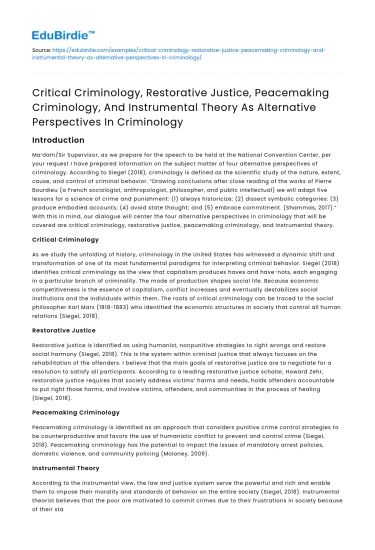Introduction
Ma’dam/Sir Supervisor, as we prepare for the speech to be held at the National Convention Center, per your request I have prepared information on the subject matter of four alternative perspectives of criminology. According to Siegel (2018), criminology is defined as the scientific study of the nature, extent, cause, and control of criminal behavior. “Drawing conclusions after close reading of the works of Pierre Bourdieu (a French sociologist, anthropologist, philosopher, and public intellectual) we will adapt five lessons for a science of crime and punishment: (1) always historicize; (2) dissect symbolic categories: (3) produce embodied accounts; (4) avoid state thought; and (5) embrace commitment. (Shammas, 2017).” With this in mind, our dialogue will center the four alternative perspectives in criminology that will be covered are critical criminology, restorative justice, peacemaking criminology, and instrumental theory.
Critical Criminology
As we study the unfolding of history, criminology in the United States has witnessed a dynamic shift and transformation of one of its most fundamental paradigms for interpreting criminal behavior. Siegel (2018) identifies critical criminology as the view that capitalism produces haves and have-nots, each engaging in a particular branch of criminality. The mode of production shapes social life. Because economic competitiveness is the essence of capitalism, conflict increases and eventually destabilizes social institutions and the individuals within them. The roots of critical criminology can be traced to the social philosopher Karl Marx (1818-1883) who identified the economic structures in society that control all human relations (Siegel, 2018).
Restorative Justice
Restorative justice is identified as using humanist, nonpunitive strategies to right wrongs and restore social harmony (Siegel, 2018). This is the system within criminal justice that always focuses on the rehabilitation of the offenders. I believe that the main goals of restorative justice are to negotiate for a resolution to satisfy all participants. According to a leading restorative justice scholar, Howard Zehr, restorative justice requires that society address victims’ harms and needs, holds offenders accountable to put right those harms, and involve victims, offenders, and communities in the process of healing (Siegel, 2018).
Peacemaking Criminology
Peacemaking criminology is identified as an approach that considers punitive crime control strategies to be counterproductive and favors the use of humanistic conflict to prevent and control crime (Siegel, 2018). Peacemaking criminology has the potential to impact the issues of mandatory arrest policies, domestic violence, and community policing (Moloney, 2009).
Instrumental Theory
According to the instrumental view, the law and justice system serve the powerful and rich and enable them to impose their morality and standards of behavior on the entire society (Siegel, 2018). Instrumental theorist believes that the poor are motivated to commit crimes due to their frustrations in society because of their statues. They believe that the criminal justice system is to serve the rich. Along with their belief, some believe that crime is necessary for the poor.
Conclusion
In conclusion, although there are a plethora of perspectives in criminology, the four discussed are critical criminology, peacemaking criminology, restorative justice, and the instrumental theory.
References
- Moloney, Joseph (2009). Peacemaking Criminology. Undergraduate Review, 5, 78-83.
- Shammas, V. L. (2017). Bourdieu’s Five Lessons for Criminology. Law and Critique, 29(2), 201-219. doi:10.1007/s10978-017-9218-3
- Siegel, L. J. (2018). Criminology: Theories, patterns, and typologies. Boston, MA: Cengage Learning.






 Stuck on your essay?
Stuck on your essay?

